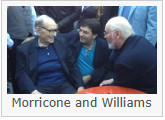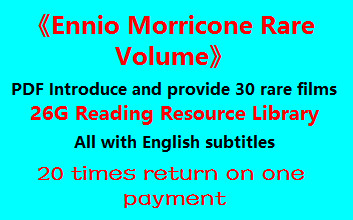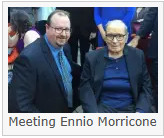Composer Ennio Morricone died on July 6, 2020, in hospital in Rome, Italy, after suffering complications following a fall at his home, in which he broke his leg. He was 91.
Ennio Morricone was born in Rome, Italy, in November 1928. He studied at the Conservatory of the National Academy of Santa Cecilia, where he specialized in trumpet performance and composition. During the 1950s Morricone orchestrated and arranged pop songs for the RCA record label, including some for artists such as Paul Anka, Chet Baker and Mina. While working for RCA Morricone also wrote theater music and classical pieces, eventually going on to form Gruppo di Improvvisazione Nuova Consonanzsa, an avant-garde musical improvisation group considered to be one of the first experimental composers collectives.
Morricone began ghostwriting for composers such as Armando Trovajoli and Mario Nascimbene in the late 1950s, before making his credited film debut in 1961 for director Luciano Salce’s Il Federale (The Fascist). He worked almost exclusively in Italian cinema in the 1960s, but started to gain some international prominence for his work with director Sergio Leone, a former classmate, whose ‘spaghetti westerns’ starring a young American actor named Clint Eastwood became unexpected hits. A Fistful of Dollars (1964), For a Few Dollars More (1965), The Good the Bad and the Ugly (1966) and Once Upon a Time in the West (1968), as well as the Burt Reynolds vehicle Navajo Joe (1966), introduced the world to his idiosyncratic personal style, mixing a traditional orchestra with unusual percussion effects, gruff chanting voices, unusual whistles courtesy of Alessandro Alessandroni, and the soaring beauty of the voice of his friend, soprano Edda dell’Orso. These scores became hugely influential and massively popular, quickly cementing his reputation as one of Europe’s leading film composers.
The late 1960s and early 1970s saw Morricone broaden his horizons, scoring films across Europe in every genre imaginable, and making his first forays into Hollywood. His frequent collaborators included directors such as Dario Argento, Marco Bellocchio, Bernardo Bertolucci, Mauro Bolognini, Terrence Malick, Giuliano Montaldo, Alberto Negrin, Pierpaolo Pasolini and Gillo Pontecorvo, and he scored such popular and acclaimed films as Two Mules for Sister Sara (1970), Duck You Sucker (1971), My Name is Nobody (1973), Salò (1975), Novecento (1976) and Days of Heaven (1978), for which he received his first Academy Award nomination.
The 1980s and 1990s saw Morricone being employed much more frequently by American directors, and some of his most popular scores of the period were for box office successes such as John Carpenter’s The Thing (1982), Brian De Palma’s The Untouchables (1987), Bugsy (1991), In the Line of Fire (1993), Barry Levinson’s Wolf (1994) and Disclosure (1994), as well as critical masterpieces such as Once Upon a Time in America (1984), Roland Joffé’s The Mission (1986), Casualties of War (1990), and Giuseppe Tornatore’s trio Cinema Paradiso (1991), The Star Maker (1997) and The Legend of 1900 (1999).
After having his score for What Dreams May Come rejected in 1998 (where he was replaced by Michael Kamen), and suffering a quite torturous post-production period on Brian De Palma’s Mission to Mars in 2000, Morricone removed himself from the Hollywood composing scene, preferring instead to stay mostly in Europe, writing for mainly Italian film and television projects, where he remained prolific, scoring more than 75 films after the turn of the millennium. His final American film, The Hateful Eight for director Quentin Tarantino, earned him a long-overdue Academy Award for Best Original Score in 2015; Morricone had been nominated for five Academy Awards – for Days of Heaven, The Mission, The Untouchables, Bugsy, and Malèna in 2000 – without winning, before being awarded an Honorary Oscar in 2007 “for his magnificent and multifaceted contributions to the art of film music”, becoming only the second composer after Alex North to be so honored. In addition to this, Morricone won three Golden Globes (from 9 nominations), six BAFTA Awards, four Grammys, and ten David Di Donatello Awards in his native Italy.
The main title from The Good the Bad and the Ugly, as well as that score’s conclusive piece “Ecstasy of Gold”, became two of Morricone’s signature pieces. Morricone’s non-film composition “Chi Mai”, which featured in the films Maddalena (1971) and Le Professionnel (1981), as well as the TV series An Englishman’s Castle (1978) and The Life and Times of David Lloyd George (1981), was also immensely popular, and because of its appearances on British TV, the theme reached number 2 on the UK Singles Chart in 1981.
In addition to his film work, Morricone wrote numerous classical works and conducted many orchestras worldwide, including the London Philharmonic Orchestra, the New York Philharmonic and the London Symphony Orchestra. He was one of the main conductors of the Orchestra Roma Sinfonietta since the mid-1990s, and conducted over 200 concerts worldwide since 2001. He lived in Rome with his wife, Maria Travia, whom he married in 1956. They had three sons and daughter: Marco, Alessandra, Andrea – who is also a composer and conductor – and Giovanni, a filmmaker who lives in New York City.
=========================
At this point I would like to offer a couple of personal reflections on Morricone. I was fortunate enough to see him in concert in London twice, at the Barbican in 2001 and then at the Royal Albert Hall in 2003, and both events were spectacular celebrations of the man and his music. I only met him face-to-face once, in February 2016, when he travelled to Los Angeles to attend the Academy Awards. The Society of Composers and Lyricists arranged a reception for that year’s music nominees, and I was able to shake his hand and pose for a quick photograph with him. As he famously refused to learn English, and considering that my Italian is virtually zero, I said just two words to him – ‘mille grazie’ – to thank him not only for the photo, but as a completely inadequate ‘thank you for everything you have done for music in your life’. He replied with a ‘prego,’ and gave me a tiny hint of a smile of acknowledgement, and that was that.

But one magical thing I did witness was a conversation between Morricone and John Williams, who was also nominated that year. These two giants of music were sat, heads together, engrossed with each other for more than 15 minutes, animatedly chatting away while Ennio’s son Giovanni translated. I was standing just a few feet away from them, and I couldn’t really tell what was being said, but it struck me that this was something of an iconic moment. It was like watching a conversation between Mozart and Beethoven, Shakespeare and Dickens, Da Vinci and Van Gogh, had these people not been separated by time and geography.
It’s almost impossible to overstate just how influential, just how brilliant, just how much of a genius Morricone was. Morricone didn’t compose at a piano, nor did he use a computer. He used a pencil and a piece of staff paper, and just wrote whatever was in his head. It’s astonishing to think that, one morning, he sat down to write some music, and then by the end of the day “The Ecstasy of Gold” existed in the world. Or “Gabriel’s Oboe”. Or “Deborah’s Theme”. Or any of the dozens and dozens of iconic themes that he penned over the course of his career. And he was prolific – there were years in the 1960s and 70s where he was writing more than 20 scores in a single year, two per month, without ever phoning it in or allowing for a dip in quality.
I don’t think there is a film composer alive today who has not been influenced in some way by Ennio Morricone. The fact that he essentially invented an entire genre of music for spaghetti westerns is achievement enough, but the fact that he was also so proficient across every other conceivable genre of music is almost unprecedented. His scores for the giallo thrillers and horror movies gave him the opportunities to push the boundaries of what film music could be, and offered early examples of what would now be classified as sampling, electronic sound design, and aural manipulation. And then there are his romantic themes; his longing, rapturous, sometimes bittersweet evocations of love and passion, which swell with orchestral elegance and are often achingly, heartbreakingly beautiful.
I don’t love everything Morricone has ever written, and there are still dusty corners of his filmography that I have yet to explore, but those scores I do love I love wholeheartedly. The Good the Bad and the Ugly. Il Mercenario. Once Upon a Time in the West. La Tenda Rossa. Vamos A Matar Compañeros. La Califfa. Giù La Testa. Questa Specie d’Amore. Allonsanfàn. Days of Heaven. Marco Polo. Once Upon a Time in America. La Venexiana. The Mission. The Untouchables. Cinema Paradiso. Nostromo. I Guardiani del Cielo. The Legend of 1900. The rejected score for What Dreams May Come. Canone Inverso. Malèna. Fateless. And I’m probably forgetting some, such was his immense and varied output.
I don’t think the full impact of Ennio Morricone’s legacy will be fully appreciated for quite some time, but I do know that, as I write this, I can say with absolute confidence that he will go down as one of the greatest composers – not just film composers, but composers, period – of the twentieth century.
Addio, Maestro.













